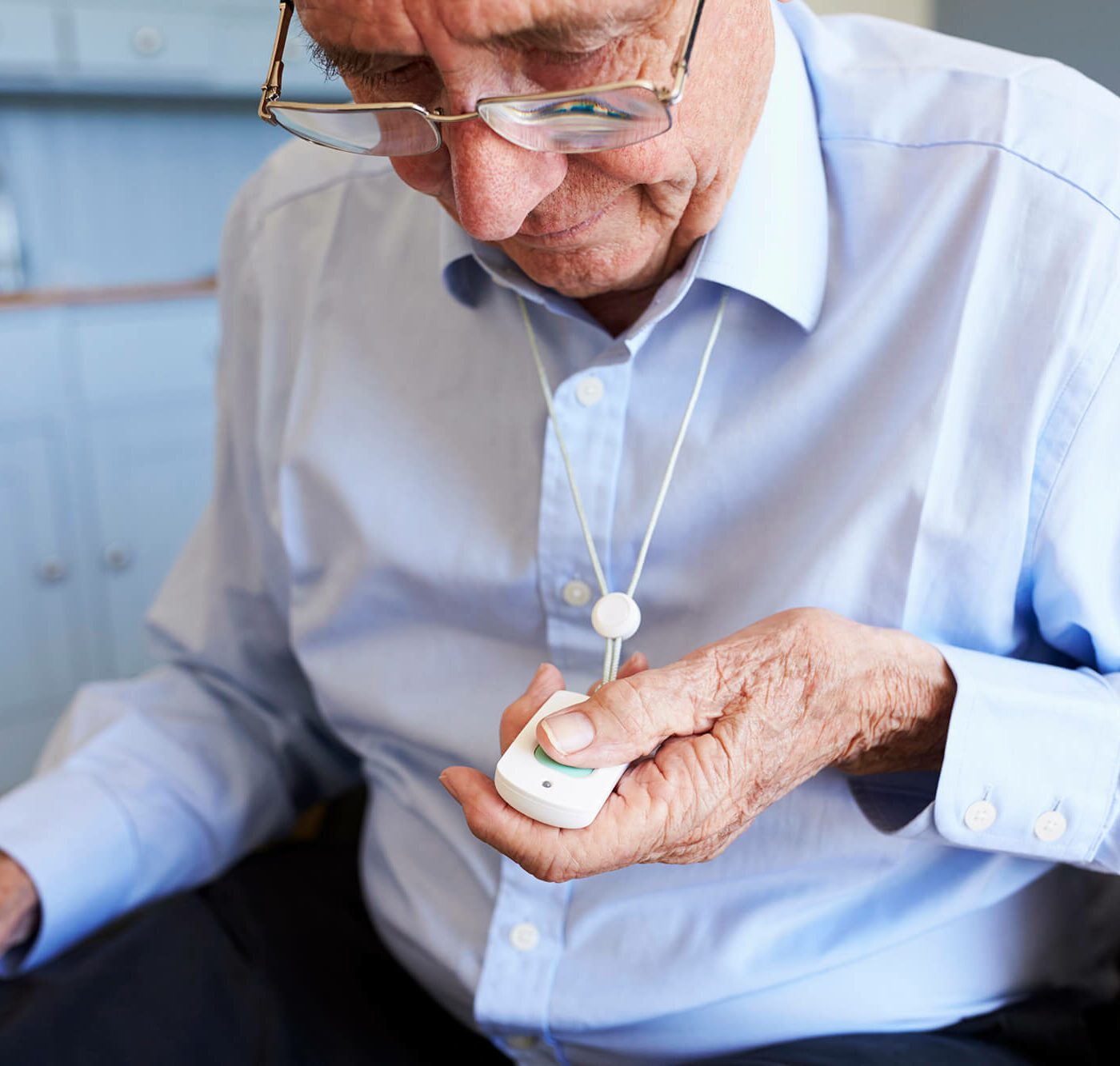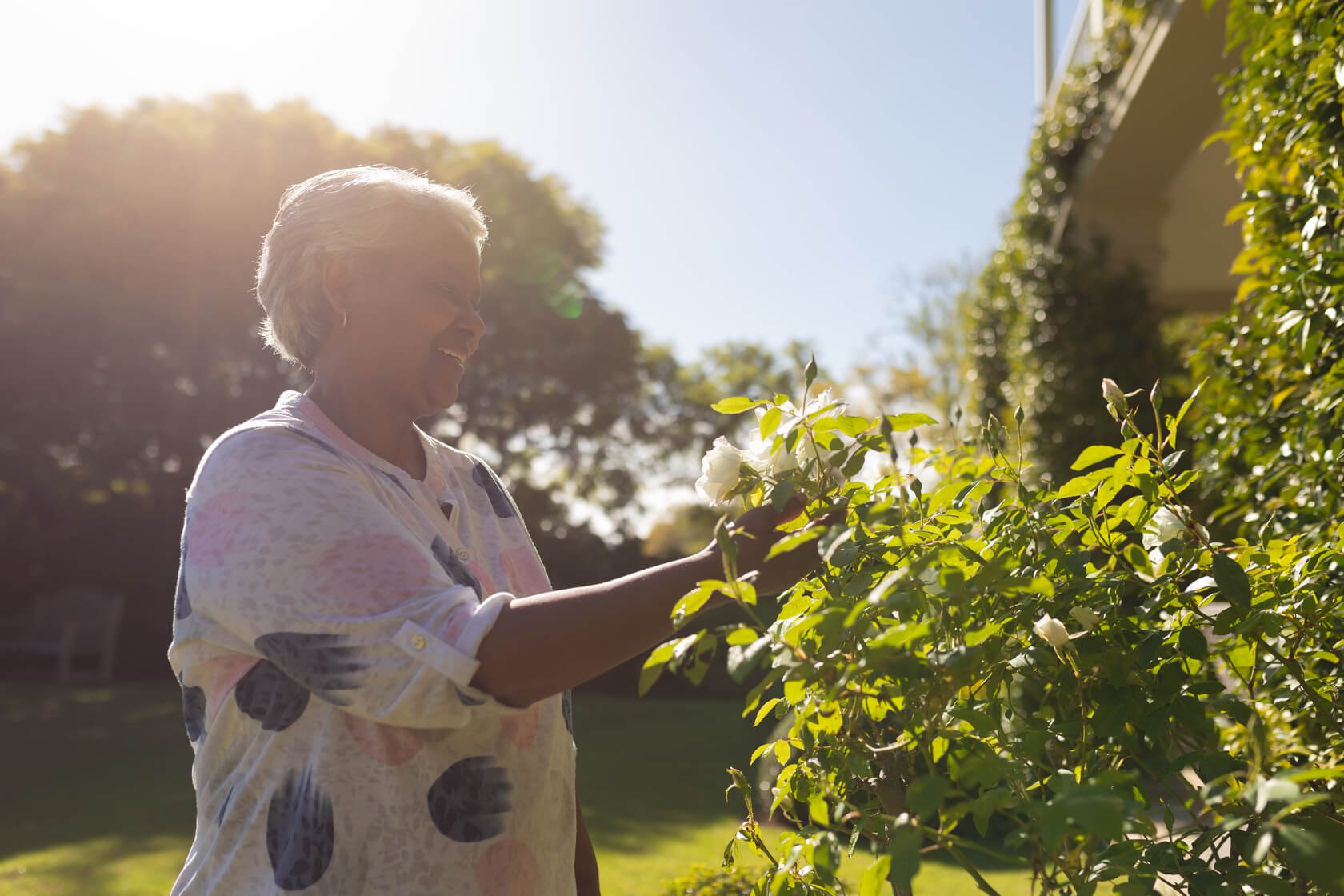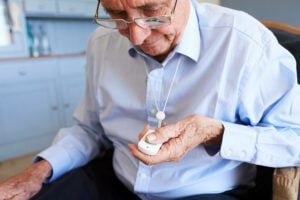How to choose the right personal alarm for seniors: A comprehensive guide

In this article:
- How do personal alarms work?
- What types of personal alarm are available?
- Do I need a landline or an internet connection?
- What the benefits of using a personal alarm?
- What happens if the emergency call button is pressed accidentally?
- Can I get a personal alarm from my local council or authority?
- What should I consider before purchasing a personal alarm?
How do personal alarms work?
Personal alarms, sometimes called ‘telecare’ are devices that can call for help if you or a loved one has an accident, medical emergency, or security concern at home. They can alert a wide range of people to help – from a family member or friend, to a care team, or the emergency services.
Personal alarm devices can range from basic alarms that send out an alert if you have a fall, to full in-home 24-hour monitoring systems. Many will offer a combination of the functions below.
Basic alarms
Similar to a smoke alarm, these send out a loud noise to alert people nearby to an accident or emergency. They’re often worn either on a wrist strap or a lanyard around the neck and feature a single, simple button for the user to press when they need assistance. Because they emit a noise and don’t directly connect to an emergency contact, they’re best suited to people who live with or close to family and friends.
Basic emergency contact alarms
Rather than emit a loud alarm, these work by calling designated family, friends or neighbours when the panic button is pressed. Most alarms will allow you to add a few different contacts in case someone if unavailable.
Alarm with fall detection
Automatic fall detection alarms are also wearable devices, but they usually come with a base unit which can automatically contact an emergency resolution centre if it detects the wearer has fallen. Trained monitoring centre staff are available 24/7 and will call the wearer through the base unit to provide the right support.
While these devices have the capacity to send an automatic alert triggered by a fall, most companies recommend the user still presses the alarm button if they’re able to, to ensure a quick response.
How does automatic fall detection work?
Most fall detection alarms use a sensor to measure air pressure changes caused by a falling motion. They then use an algorithm (computer calculation) of the change in air pressure, force of motion, and impact of the resulting knock to determine if an alert for help needs to be sent.
Monitored pendant alarms
These alarm services are also usually made up of two component – the alarm pendant emergency button, which is worn by the user – and the alarm base unit, which is the alarm’s operating system. When alarm users press the pendant’s call button, the base unit raises an alarm with a 24/7 response team. The base unit will enable 2-way voice calling so that the responder can get a clear picture of what’s happened, before sending medical assistance to their home.
GPS trackers
These small devices usually connect to a mobile phone app – allowing family members to see the live location of a loved one. They are particularly useful for people living with dementia who may get lost easily. Some trackers offer ‘geo-fencing’ which can send an alert if a loved one leaves a designated area, such as their home address. Others have features such as location history, so you can see where a loved one spends their time.
Trackers often have a secure clip so they can be attached to bags, belts or keys. You can also get wearable options, and some more discreet options, such as necklaces with a hidden tracker.
Companion watch
This is a specific brand of personal alarm that looks just like a regular watch, which can be a good option if you or your loved one feels uncomfortable wearing a traditional alarm.
The watch has three core functions – an SOS button which can call up to eight emergency contacts, in-built fall detection which will alert contacts via an app on their mobile phone, and a GPS tracker which will send out a location if the wearer leaves their personalised ‘safe’ zone.
Detector alarms and home monitoring system
This home-based systems are designed to support independent living. Sensors can passively monitor environmental changes around the home and raise the alarm if something appears out of the ordinary. Examples include –
- Door sensors that monitor when doors are open and used.
- Pressure sensors – often used on a bed or in a chair. They can send an alert if a loved one’s routine changes, for example if they get out of bed during the night, or don’t get up at the right time in the morning.
- Appliance sensors can build a picture of a loved one’s routine too. They can identify things like how often the fridge is opened, when a kettle is used, or when they watch television.
- Temperature sensors can detect a a change in temperature in the property and raise an alert if it becomes dangerously high or low. Some systems also offer the functionality to remotely adjust the temperature for your loved one to ensure they’re comfortable.
- Flood sensors are especially useful for those with memory loss who may forget they have a tap running. The attach to the floor and send out an alert if they come into contact with water.
Additional consideration
A key safe is a small, secure box where you can store a key to your or your loved one’s property. They usually unlock with a 4 digit code that you can choose yourself, and can be fixed to an outside wall. It’s often a good idea to have a key safe if you’re using a personal alarm, as it’ll ensure family or the emergency services can get into your home and help you if you’re unable to come to the door.
Do you need an analogue phone line for a personal alarm, or can I use my mobile phone?
While a lot of personal alarm services do use a landline phone socket to connect to a response team, there are effective alternatives that rely on a mobile network or Wi-Fi instead.
A digital GSM alarm uses an internal SIM card, which connects to the strongest mobile phone network available to make the call to a monitoring team. It too comes with a wearable emergency button, and the alarm unit simply needs to be plugged into a mains electricity socket.
There’s also a growing range of alarms that can be set up and managed through a smart phone app. Much like traditional alarms, they use a wearable alarm button which can be activated in an emergency situation.
As well as alerting a dedicated response team, some mobile alarms allow the user to add the telephone numbers of friends or family members they’d like to alert if they fall or have an accident. These contacts will then be automatically notified through an app on their own phones if their help is needed.
This type of alarm can also provide extra peace of mind to older couples who live together – but enjoy doing their own tasks around the house and out in the garden.
When setting up your alarm, it’s important to ensure you have the right Wi-Fi connection. Many systems operate using 2.4GHz Wi-Fi connections only, and will not work on 5GHz connections. This is because 5GHz is more likely to be weakened or blocked by obstacles like walls, floors, and ceilings, while 2.4GHz Wi-Fi connections travels faster and at a wider range making it more reliable in an emergency situation.

What are the benefits of using a personal alarm?
The main reason for using a personal alarm system is to support independent living in later life.
It’s estimated that 97% of people want to grow old in their own homes. However, as we age we’re likely to become less steady on our feet, and a little more forgetful – which can increase the potential for accidents. For an older person living alone, an accident can quickly become a serious emergency if they’re unable to get help quickly, which is why personal alarm systems are becoming a key part of elderly living, and helping more people stay out of residential care.
For elderly people living with certain medical conditions, an alarm can connect them to a rapid response team should they need specialist medical attention too – this can be critical for those at risk of falls, stroke, seizures, or those living with heart problems.
For example, take a long-term medical condition like diabetes. While it can easily be managed day to day, a personal alarm adds an additional layer of support if an older person forgets to check their blood glucose, and starts to experience dangerous symptoms such as blurred vision, confusion or fatigue.
With a personal alarm, the period of time it takes to get help can be significantly reduced too, and the emergency services can even be informed of things like your medical history before they arrive. This can lead to more positive heath outcomes, and aid a faster recovery.
What happens if the emergency call button is pressed accidentally?
One common concern with elderly alarms is what happens if they are activated accidentally.
False alarms are a lot more common than you think, and the monitoring team are likely to expect a few accidental calls, especially while you’re getting use to wearing your emergency call button.
If you do press it accidentally, simply tell the team that it was a false alarm and you don’t need assistance at that time. While it may feel awkward, don’t stay silent – this could be misunderstood as you being in trouble or unconscious and lead to the emergency services being called.
Can I get a personal alarm from my local council or the NHS?
If you live in sheltered housing, or an assisted home provided by the council it’s likely to be fitted with a lifeline alarm – which will alert a member of an onsite team. The cost of these is usually factored into the buildings service charge or rent, but may sometimes be free.
It used to be that if you were over pension age, you’d often be offered a free personal alarm for your own home through a special scheme. With local councils across the UK now facing funding cuts, these schemes are unfortunately on the decline.
However, it’s always best to check with your local social services team or NHS occupational therapist before buying your own alarm. Even if there’s no free service there may be ways to save some money. Some personal alarm providers have partnerships with local councils and may offer discounts. Or, if you have a long-term condition that requires regular medication, or are if recognised as a disabled person you should qualify for VAT relief on personal alarm equipment.
VAT exemption
Personal alarms can be VAT-exempt products if the user meets certain criteria set by HMRC. This can help you keep costs a little lower. The criteria for VAT exemption includes –
- being registered disabled
- being chronically sick
- having a condition that requires regular medication or a long-term illness lasting longer than 3 months
- the product can been specially adapted to your needs
The HMRC website can tell you more about how to get VAT exemption on disability products.
What should I consider before purchasing a personal alarm?
Think about routine and logistics
If your alarm has a base unit it’s important to place it somewhere central in the home – this means it’s easily accessible in case you or a loved one needs to make an emergency call using the base unit’s in-built speaker. It should also be close to a wall mounted power socket – so you’re not relying on extension cords – which can be an unnecessary trip hazard.
Most wearable alarms should be waterproof due to the bathroom being a high risk area. However, cheaper models may not be as water resistant as they claim, so it’s always worth testing this first for peace of mind.
Check how complex installation may be
Many alarms have been designed to ‘plug in and play’ meaning they require very little set up and can start being used straightaway. However, more complex home monitoring systems may require a professional installation service. It’s worth checking with the alarm provider or manufacturer what they’re installation support is – if they charge a one-off set-up fee, or whether they can provide clear instructions for you to install it yourself.
Ageing in Place: What is Technology Enabled Care?
We spoke to CEO Alyson about the importance of modernising health and social services through technology to enable people to take control of their own health and wellbeing.
Mobility matters
While there are a lot of different options for alarms some will fit you situation better than others. If the alarm is for someone with dementia who gets confused and wanders away from home, an alarm with a broad range GPS feature is really important. If you or a loved one has arthritis and struggles with fiddly things like small buttons, it’s probably best to go for an easy-to-use personal alarm, and a wearable pendant over wrist options.
Factor in forgetfulness
Alarm pendants usually only have limited hours of battery charge. If you or a loved one are at risk of forgetting to put the pendant on charge, you may want to look for an option with an extended battery life, have a back-up battery available somewhere obvious in the home, or ask a visiting carer or family member to keep pendants charged.
Consider additional cost
If you’re looking for an affordable option a the price range for a basic alarm can be between £4 to £90. These types of alarm include simple pendant alarms too, which will sound a loud noise when the wearer falls.
For a system connected to a monitoring service, or a landline-based alarm, it’s important to factor in ongoing costs beyond the initial cost of the alarm equipment. Almost all providers will change via a monthly plan or annual subscription to cover your access to the 24/7 response team and their own monitoring costs. There may be an installation cost too to ensure it’s set up correctly.
Useful links
Find a trusted provider of personal alarms in your area with Which’? Trusted Traders
Sources:
- https://www.agespace.org/personal-alarms-for-the-elderly
- https://www.companionwatch.com/
- https://www.ageuk.org.uk/products/mobility-and-independence-at-home/personal-alarms
- https://www.lifeconnect24.co.uk/how-it-works/vat-exemption/
- https://www.centurylink.com/home/help/internet/wireless/which-frequency-should-you-use.html
Read more care guides

How to prepare for a live-in caregiver
Care at home: how to prepare the home for a live-in caregiver A live-in carer can make a massive difference to your loved one’s quality

6 tips for finding the right live-in carer
Finding the right live-in carer is a significant and deeply personal decision, impacting your loved one and the entire family. You’re seeking someone trustworthy, compassionate,

The cost of care – everything you need to know
The true cost of care – everything you need to know Discover the true cost of care and explore your funding options with our care

Understanding autism in older adults
While Autism is usually diagnosed in childhood, an increasing number of older adults are being formally diagnosed in later life. Masking autism symptoms can result

A guide to speaking with a loved one about home care
Why do older adults resist care? A guide to speaking with a loved one about home care Bringing up the topic of care at home

How to choose the right personal alarm for seniors: A comprehensive guide
Personal alarms for elderly Discover how personal alarms work, who they’re best suited to, and how they provide greater peace of mind to older people